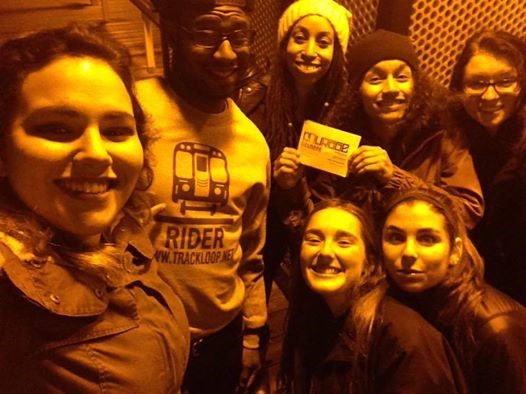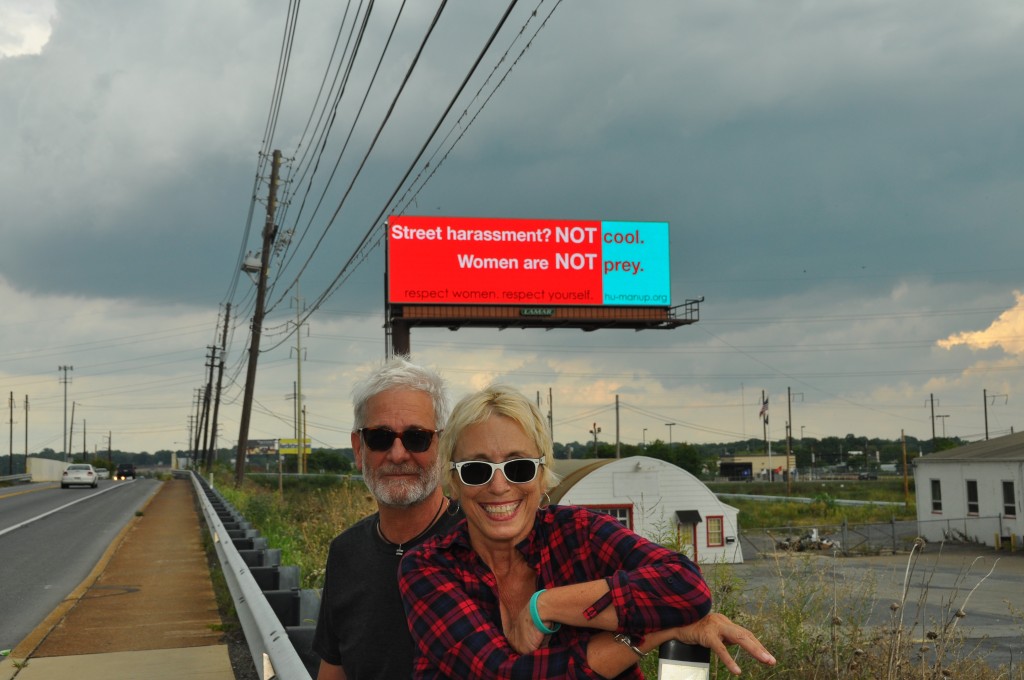Devon is a student at the Fashion Institute of Technology. This past semester, her class was given the task of creating a video about a social cause of their choosing. Being a young woman living in New York City, she felt the topic of street harassment was a personal and meaningful cause she wanted to address in hers.
USA: Flash Mob Against Harassment on the CTA
Sarah Colomé , IL, USA, SSH Blog Correspondent
Cold air, don’t care. Chicago’s time honored tradition of social protest reared its glorious head on Wednesday, November 5th, sparking public conversation about street harassment on the Chicago Transit Authority (CTA) train system. Bridging passion, activism, and love of music, members of the Courage Campaign: CTA claimed a section of the Red Line as their own, breaking into a flash mob advocating public safety awareness.

Commonly referred to as the “el” or “L” the city of Chicago houses the second largest mass transit system in the country, according to the American Public Transportation Association. With an annual ridership of 229.12 million on the train system alone, in person contact — whether consensual or not — is a frequent reality for those who depend on public transportation in the city.
Frustrated with the lived realities of so many who traverse the transit system each day, Courage Campaign: CTA founder Kara Crutcher decided to take action in order to address these stories of harassment. “I’ve experience and heard horror stories from tons of people taking the CTA,” Crutcher explains on the campaign’s Facebook page. ”Commuters have been physically, sexually and verbally abused on the CTA, and it’s unacceptable. Everything begins with awareness.”
Awareness was to be had, and in droves when Crutcher and other Courage Campaign participants exploded into their flash mob. Using an adaption of Aretha Franklin’s timeless song “Respect,” the group swapped in the word “courage” for “respect,” ending with the call to action: “We have the courage to stop harassment on the CTA – do you?”
Watching the video, we see the scene open with a young man incessantly hitting on a young woman before the mob broke into their courage song.
Crutcher explains, “The best part was seeing how uncomfortable everyone was initially – and no one said anything.” Noting several reactions, she noticed people seeing the exchange, shifting uncomfortably, and looking around, but many clapped in support at the end of the skit.
Partnering with a photographer, among other campaign members, the concept of a flash mob was derived on the premise that the action would “be helpful in pushing this project forward,” particularly after seeing the popularity of a similar flash mob done by the Lion King cast on a New York subway in early August. As a dancer in college, Crutcher knows the power of performance.
Produced as collaborative effort, the flash mob finished each of the performances by providing campaign flyers, hoping to entice more support and awareness about the campaign, and the issue of harassment overall. The flyers included actions items, contact information and the campaign’s logo, which serves as a sort of homage to the city of Chicago. Hoping to gain momentum from civic pride Crutcher explains, “I think that is what will make this strong – people are so loyal [to this city.]”
For more information on Courage Campaign: CTA or to contribute to their cause, visit their Facebook page, and follow them on Twitter at @CourageCTA.
Sarah is a progress-focused educator and advocate dedicated to building strategic coalitions centered on creating social change who serves as an adjunct professor in DePaul University’s Peace, Justice and Conflict Studies department. You can follow her updates on Linkedin or hear her perspectives on Twitter.
USA: An inside look at the forthcoming documentary “The People’s Girls”
Sarah Colomé , IL, USA, SSH Blog Correspondent
 The Student Nonviolent (National) Coordinating Committee’s vital work during the American Civil Rights Movement of the 1960’s, Chicago’s “We Charge Genocide” Delegation bringing issues of police violence before the United Nations in the 1950s, and the recent developments in attention to sexual assault on college campuses: Youth-led activism, advocacy, and community-building is deeply engrained in the success of several of the globe’s most well-recognized social movements, in addition to many of the less visible ones.
The Student Nonviolent (National) Coordinating Committee’s vital work during the American Civil Rights Movement of the 1960’s, Chicago’s “We Charge Genocide” Delegation bringing issues of police violence before the United Nations in the 1950s, and the recent developments in attention to sexual assault on college campuses: Youth-led activism, advocacy, and community-building is deeply engrained in the success of several of the globe’s most well-recognized social movements, in addition to many of the less visible ones.
Globally, youth are taking active steps to challenge inequality, to create the preferred world that they will someday leave behind. In Cairo, Egypt, 26-year-old Tinne Van Loon and 22-year-old Colette Guhnim are doing just that, taking strides to bring sexual harassment to the forefront, not just as an issue among Arabs or within the boundaries of Egypt, but among all nations and communities. I was lucky enough to speak with Van Loon last week about the focus, standing, and long-term goals for the team, and their forthcoming project.
Titled The People’s Girls, Van Loon and Guhnim’s upcoming documentary focuses on the realities of street harassment, and society’s apprehensive in combatting it: “Two women battle the newest epidemic in Egypt, sexual harassment. Society stands in their way. Will they succeed?”
The recently released teaser for the film gives a glimpse of what these two filmmakers hope will be soon screened across film festivals after the documentary’s anticipated release in January 2015. Guhnim outlined the focus of the documentary, explaining how the film will document three different people with varying views of, and interactions with, street harassment: Esraa, a 25-year-old Egyptian woman and activist “who challenges social norms by performing in storytelling theater pieces about sexual harassment,” Abdullah, a 28-year-old tuk tuk driver from a working class neighborhood, and a to-be-determined third participant, who the filmmakers hope will be an Egyptian lawyer working at a women’s rights organization focusing on sexual harassment. “We really need to let the women speak for themselves,” Van Loon told me.
Highlighting the power of personal narratives, Van Loon explained, “Storytelling is important to bring issues to light, and makes people care and change their mind… statistics aren’t human.” The bravery of women who walk daily through threat of harassment and assault, is only mirrored by that of the filmmakers, shining light on such a devastatingly common global struggle.
According to the recent Study on Ways and Methods to Eliminate Sexual Harassment in Egypt, sponsored by the UN Entity for Gender Equality and the Empowerment of Women, 99.3% of Egyptian women report having experienced sexual harassment, with 49.2% reporting they experience harassment on a daily basis. The People’s Girls, puts human faces on these statistics, capitalizing on Van Loon’s observation that since the 2011 revolution, “less people are denying [the frequency] of sexual harassment… activism around street harassment in Cairo is huge.”
Esraa, one of the film’s main characters, highlights her own experiences in one of her interviews, as recounted on The People’s Girls’ Facebook page:
“I got harassed since I was 6 years old. One of my relatives who was older than me by 10 years did it. He told me “let’s play a game”. I was shivering, and I refused to play. At this age I wasn’t aware of what the hell that was, but I discovered when I met him 10 years later, that while I thought that I had forgotten the story, time said no.”
While openly recognizing the problematic frequency in which women experience harassment in Egypt, the filmmakers firmly assert that the film is not meant to perpetuate a negative, or stereotypical framework of the country, or its people. “Everywhere we’ve been in the world, the United States, Latin America, Europe, South Asia, we’ve experienced various levels of sexual harassment,” said Guhnim. “This is a problem of a patriarchal society, which is unfortunately worldwide. We’ve gotten a lot of hateful comments towards Arabs and Egypt and we really want to point out that not all men are like this.”
Furthering this point, while speaking last week Vin Loon passionately stated, there is “no other place in the world I’d rather live even though Street Harassment is such an epidemic.”
Speaking specifically on what she views as the root cause of harassment, Vin Loon explained the need to shift the prevention narrative, taking issue with an approach focusing on “don’t harass this woman because there’s a man attached to her, rather than don’t harass this woman because she’s a human being.”
Breaking down concepts of patriarchy and possession, the film encapsulates the dangers of gender norms and gender roles. One interviewee in particular encroaches on this topic in the teaser stating, “I wish every father and every mother would stop saying ’you are a boy, you are a girl, you are a boy, you are a girl’ because the main problem in my opinion starts from these two sentences. “
The filmmakers hope to use the film as an advocacy tool, focusing on collaboration and highlighting the work already happening on the ground. Recognizing the global effectiveness of youth-led activism, I asked Van Loon if she noticed a similar leadership pattern in Egypt. “The activism around sexual harassment is huge in Cairo, especially since the revolution… It’s really more mainstream,” she explained, citing that while being “youth-led,” in Egypt, the term youth regularly includes people up to the age of 30 years old. “And it’s really something that we also want to show in our film, and that’s kind of the reason we wanted a global audience for the film. To show these active groups in other countries, the creative ways that Egyptians are dealing with this issue because I really think they are, very innovative…There’s over a dozen organizations working on this issue. We want to them a larger reach as well.”
The People’s Girls is anticipated to release in January 2015. If you would like to support the work of Vin Loone and Guhnim, please consider making a contribution to their Kickstarter campaign before October 4th. Solidarity starts with showing up, no matter what form that may take.
Sarah is a progress-focused educator and advocate dedicated to building strategic coalitions centered on creating social change who serves as an adjunct professor in DePaul University’s Peace, Justice and Conflict Studies department. You can follow her updates on Linkedin or hear her perspectives on Twitter.
Video: “No mas puercas costumbres” (No more degrading customs)
Watch the video “No more degrading customs” (No mas puercas costumbres)
Film creator Paulina Romero shared the following about it with me for the SSH blog.
“Since my teenage years, I suffered street harassment in the streets of my country, Mexico. “No more degrading customs” came out from my personal need to denounce it. It’s a shortcut that exposes the patriarchal violence experienced by women in the streets of Mexico, aiming to help eliminate it.”
Paulina studied International Affairs, focusing in women studies and feminism. During her college years, she got involved in activism for women’s rights. Today, she is producing “El Arbol de Las Manzanas”, her first feature documentary about migrant women in New York City.
Billboards against Rape Culture in Lancaster, PA

UPDATED: Here is the Ms Magazine article about the billboards. It was syndicated on Care2’s site.
Yesterday I had the privilege to meet Ray and Adele, the co-directors of hu_MAN Up, in Lancaster, PA. They’ve been involved in a number of efforts to challenge rape culture with their latest being three electronic billboard messages near the Franklin & Marshall campus. This is the one about street harassment. They’re determined to not just preach to the choir when it comes to these kinds of messages and hope that their billboard messages are reaching a lot of people who may not otherwise hear about rape culture or the need for consent and respect.
I’m writing an article about their billboards for Ms Magazine’s blog this week, so stay tuned.
They just received their 501c3 status and are fundraising to be able to do ads on buses and more billboard messages. Donate if you can!


